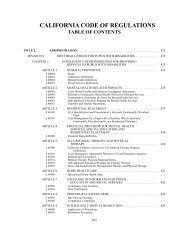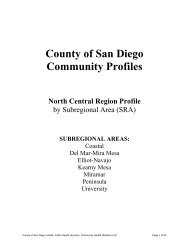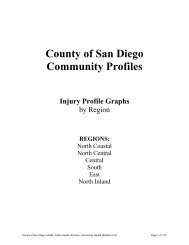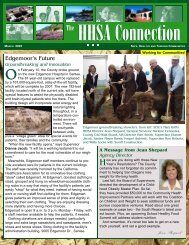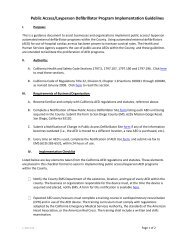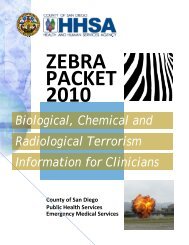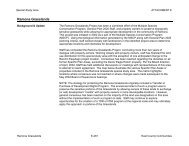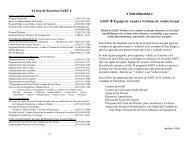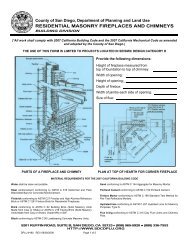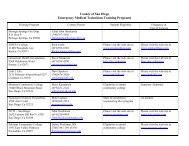Kearny Mesa Juvenile Detention Facility - County of San Diego ...
Kearny Mesa Juvenile Detention Facility - County of San Diego ...
Kearny Mesa Juvenile Detention Facility - County of San Diego ...
You also want an ePaper? Increase the reach of your titles
YUMPU automatically turns print PDFs into web optimized ePapers that Google loves.
<strong>County</strong> <strong>of</strong> <strong>San</strong> <strong>Diego</strong> – <strong>Juvenile</strong> Justice Commission<br />
<strong>Kearny</strong> <strong>Mesa</strong> <strong>Juvenile</strong> <strong>Detention</strong> <strong>Facility</strong>2011<br />
approvals sought, regulatory agencies involved, training required or provided etc.) and depend,<br />
in part, on whether the research involves only archival data or collaborative data analysis<br />
conducted in conjunction with the Probation Department research <strong>of</strong>fice versus data collected<br />
directly from minors in custody at Probation-run facilities or minors who are Wards <strong>of</strong> the Court<br />
but living in the community.<br />
2. An ongoing inter-disciplinary research program that conducts research at <strong>San</strong> <strong>Diego</strong> <strong>County</strong><br />
Probation Department facilities for juvenile wards <strong>of</strong> the court is led by Dr. Amy E. Lansing. As<br />
<strong>of</strong> 2012, this program <strong>of</strong> research was funded by the National Institute <strong>of</strong> Health (e.g., National<br />
Institute <strong>of</strong> Child & Human Development, National Center on Minority Health & Health<br />
Disparities), NIH-supported organizations within the University <strong>of</strong> California, <strong>San</strong> <strong>Diego</strong> system<br />
(e.g., UCSD’s Clinical & Translational Research Institute, UCSD’s Comprehensive Research<br />
Center in Health Disparities) and/or UCSD organizations (e.g., Academic Senate). The<br />
following criteria is utilized to protect youth who participate in their research as well as UCSD<br />
staff:<br />
a. <strong>Juvenile</strong> Court applications are submitted, and reviewed by the Presiding Judge and<br />
<strong>Juvenile</strong> Court lawyers, to request access to Wards <strong>of</strong> the State. After review, any needed<br />
modifications, and approval, a <strong>Juvenile</strong> Court Order provides access to youth in Probation<br />
facilities and/or monitored by the Probation Department.<br />
b. Project requests are made to the <strong>San</strong> <strong>Diego</strong> <strong>County</strong> Chief Probation Officer and<br />
appropriate Deputy Chiefs (e.g., Deputy Chief <strong>of</strong> Institutional Services for research<br />
occurring on site at Probation Department facilities). Probation Department approval is<br />
sought for each research project.<br />
c. The Institutional Review Board (IRB) at the University <strong>of</strong> California, <strong>San</strong> <strong>Diego</strong> (and IRBs at<br />
any collaborating institutions such as Yale University, <strong>San</strong> <strong>Diego</strong> State University) must<br />
first approve any research project before it begins. The IRB always consists <strong>of</strong> a Prisoner<br />
Representative, as well as other members with specific expertise relevant to each<br />
reviewed project (e.g., Developmental Psychologist, Neuropsychologist, Radiologist,<br />
Pediatrician, Neurologist etc.). See http://irb.ucsd.edu/3.7.pdf<br />
d. After UCSD IRB approval is obtained, the research protocol and all consent and assent<br />
forms are sent to the California Department <strong>of</strong> Health and Human Services for review<br />
related to Subpart C regulations (43 FR 53655; Additional DHHS Protections Pertaining to<br />
Biomedical and Behavioral Research Involving Prisoners as Subjects). Research involving<br />
incarcerated youth may only begin after this additional approval is obtained. See<br />
http://www.hhs.gov/ohrp/humansubjects/guidance/45cfr46.html#subpartc<br />
e. All youth participants voluntarily assent (13-17 year olds) or consent (18 year olds),<br />
following ethical standards and using language geared toward adolescents. Specific<br />
questions are asked <strong>of</strong> the youth during the assent/consent process to confirm that the<br />
youth does understand what participation in the study means.<br />
f. Parental Consent is sought for minors, and neutral Participant Advocates facilitate youth<br />
and/or parental consent.<br />
g. Consent/Assent (answering questions, reviewing right to withdraw from the study at any<br />
time etc.) is an ongoing process during participation.<br />
h. A Federal Certificate <strong>of</strong> Confidentiality is obtained for each research project and protects<br />
collected data. All Universities, co-investigators and faculty involved in any given research<br />
project are included on the Federal Certificate issued by the National Institute <strong>of</strong> Health<br />
and are held to the same requirements with respect to confidentiality, compliance with<br />
privacy safeguards and protection <strong>of</strong> human participants in research as well as additional<br />
requirements for research with vulnerable populations. See http://grants.nih.gov/grants/policy/coc/<br />
i. UCSD Youth Study staff who have contact with the youth and/or collect archival data at<br />
Probation-run facilities, each go through:<br />
Page 18 <strong>of</strong> 25



